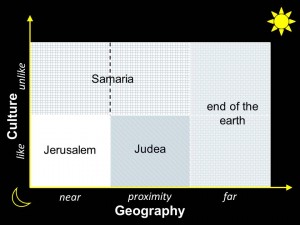In my last post we began to explore the idea of living strategically. After Jesus rose from the dead and as He was ready to ascend back to heaven He outlined for His followers the strategy in which He would lead us for the rest of time. Jesus laid out for them and us the strategy that would usher Him back to earth in His Second Coming. This was not something just for the first century, but for all the centuries to come. This was not something just for super-Christians, but for all us ordinary Christ-followers in all ages and in all places. If we are Christ’s, we’re all on one mission—God’s.
What does it mean to live strategically?
Let’s start with a definition: Strategic: strǝtì:dʒik. adj. of or relating to strategy ǁ of material needed for war but not available in sufficient quantity in the country needing it. (Webster)
Honestly, when I saw the second part of the definition, I was surprised. That’s not what came to mind when I thought of “strategic.” But then life is often a battle, isn’t it?
What do you need in this arena of battle/life which you may not possess in sufficient measure? Several things, including: purpose, vision, power, and intentionality.
Jesus addressed all three when He said: “But you will receive power when the Holy Spirit has come upon you, and you will be my witnesses in Jerusalem and in all Judea and Samaria, and to the end of the earth.” (Acts 1:8)
The unfolding of the rest of history is laid out in this simple sentence. This is the God-designed, divinely-ordained strategy for all the rest of time—for His entire Church, for each church, and for every Christian.
As we’ve seen the strategy has four key parts: the advance of the gospel to …
1) “Jerusalem”
2) “all Judea”
3) “and Samaria”
4) “to the end of the earth.”
Let’s consider just the first prong of this four-fold strategy—reaching our Jerusalem. Each prong operates on two axes: geographical and cultural. To identify and deploy strategically into your “Jerusalem” think in terms of those “geographically near” and “culturally like” you. I’m talking about people close at your hand and “like” you in things like income, neighborhoods, tastes, schools, work, ethnicity, language, etc.
Jesus is calling each of us to live strategically (with purpose, vision, power and intentionality) in relationship to the people He has put near to us both geographically and culturally. How are we to do that?
This starts out pretty simple. Just take a moment and write down the names of three to five people under each of these categories:
- Family
- Close friends
- Co-workers/neighbors/classmates
- Acquaintances/old friends/extended family
When you’ve completed that step, slip the paper into your Bible so you see it each day as you read God’s Word and pray. Include these people specifically in your praying.
In addition to praying, watch for opportunities to step intentionally more deeply into relationship with those you’ve identified. It may come through an opportunity for conversation. It might be through the possibility of assisting them with something. Maybe the Lord will open a chance to spend some time with them.
Whatever form it takes, cross that line on purpose, for Jesus, and with fresh faith. God is answering your prayers! And He is leading you into a deeper relationship with the people He has sovereignly placed in your “Jerusalem.”
Be encouraged! You are beginning to move with God in your immediate corner of the world!
